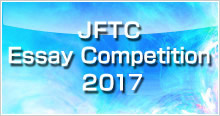Remarks by Selection Committee Chair, Dr. Iwao NAKATANI
As chair of the Selection Committee, I am most delighted that this year’s essay competition sponsored by the Japan Foreign Trade Council received, as in past years, many interesting essays from people in a variety of countries. I would like to express my sincere appreciation to everyone involved for their efforts.
One of the major reasons why we have chosen “Global Capitalism and Japanese Companies” as the theme of this year’s competition was to have entrants to the competition discuss freely how Japanese companies should respond to the increasing globalization of capital markets. Recently it has become commonplace for investment funds and other international capital to move across national boundaries for M&A, so that may Japanese companies are pressed to develop corporate governance and management policies that are in step with international standards. With this in mind, we thought that discussion by the entrants to the competition on the possible vision of the ideal Japanese company would be of great reference for all of us.
I am pleased to say that we received many interesting essays on the theme. We received entries from 22 countries, including Japan, with about half of the total number of essays being submitted in English. Our essay competition may be the only one in Japan that attracts international participation with this kind of worldwide span.
Unfortunately, however, there was not one that the entire Selection Committee wanted to strongly back for the Grand Prize. In the end, the Selection Committee decided to select the following four essays for the Prize for Excellence:
In “The Win-win-win Globalization and Japanese Companies,” Heng DYNA, a 24 years old Cambodian student living in Tokyo, puts forth the compelling argument that Japan should skillfully combine its technology with global capital and developing countries’ human resources to build a win-win-win relationship among the three.
In “Gundamnomics: Transforming Corporate Japan for the Challenges of Global Capitalism,” Pin-Quan NG, a 22 years old Singaporean student residing in the United States, takes the example of the great transformation of the Japanese economy in the postwar period, including the recent development of Japanese anime and robot technology, and goes on to discuss a further transformation in the future.
In “Responding to Global Capitalism: Today’s Priority on Japan’s Business Agenda,” Séphora VOLCY, a 23 years old French student residing in France, discusses what Japanese companies and the Japanese government should do to restructure their own path while retaining a unique Japanese perspective in the face of the new reality of global capitalism.
In “A Proposal for Japanese Companies: Become Alert and Solid Corporations,” Wataru KAMIYA, a 33 years old Japanese organization official residing in Tokyo, points out that the Japanese concept of “amae” or “presumption of favor” has been part of Japanese companies’ business rules. Mr. Kamiya makes the unique proposal that “amae” must be eliminated.
Each of these essays presents very interesting points and is worth reading. There was no essay, however, that stood out as the one that the Selection Committee members should unanimously strongly back. For this reason, the Grand Prize will unfortunately not be awarded in this year’s essay competition.

